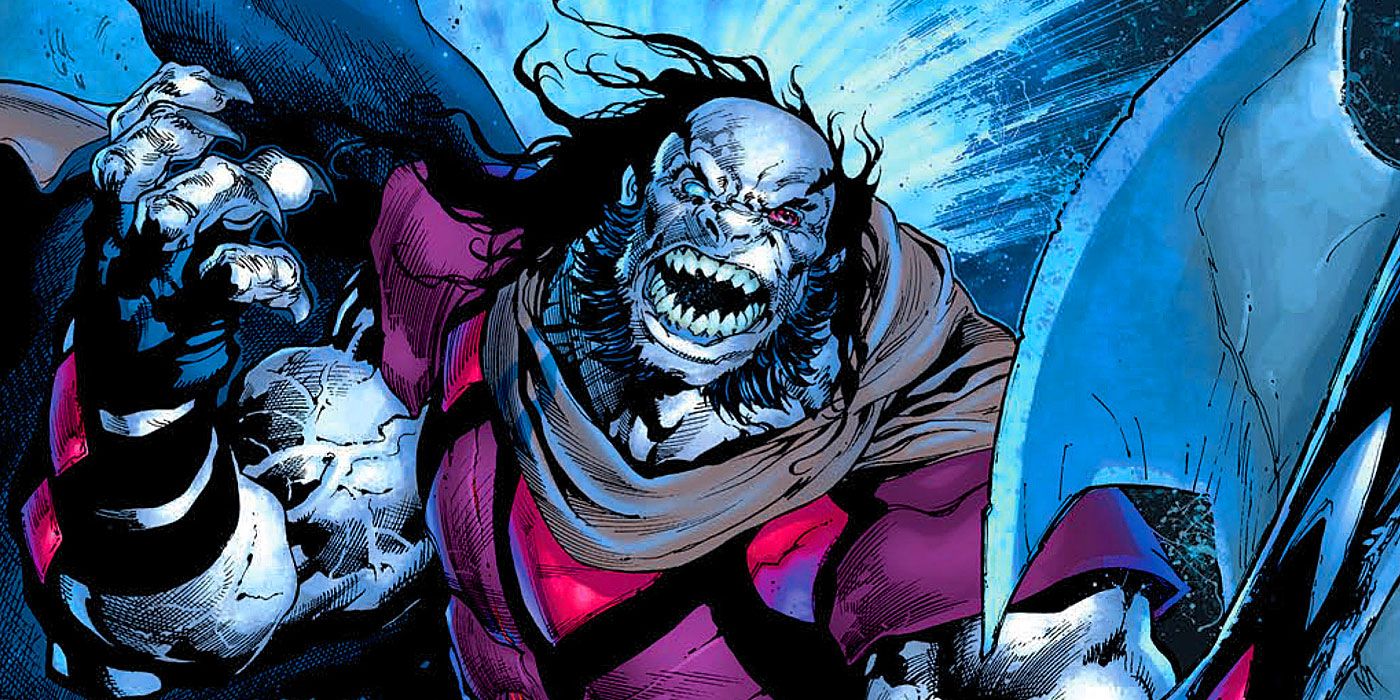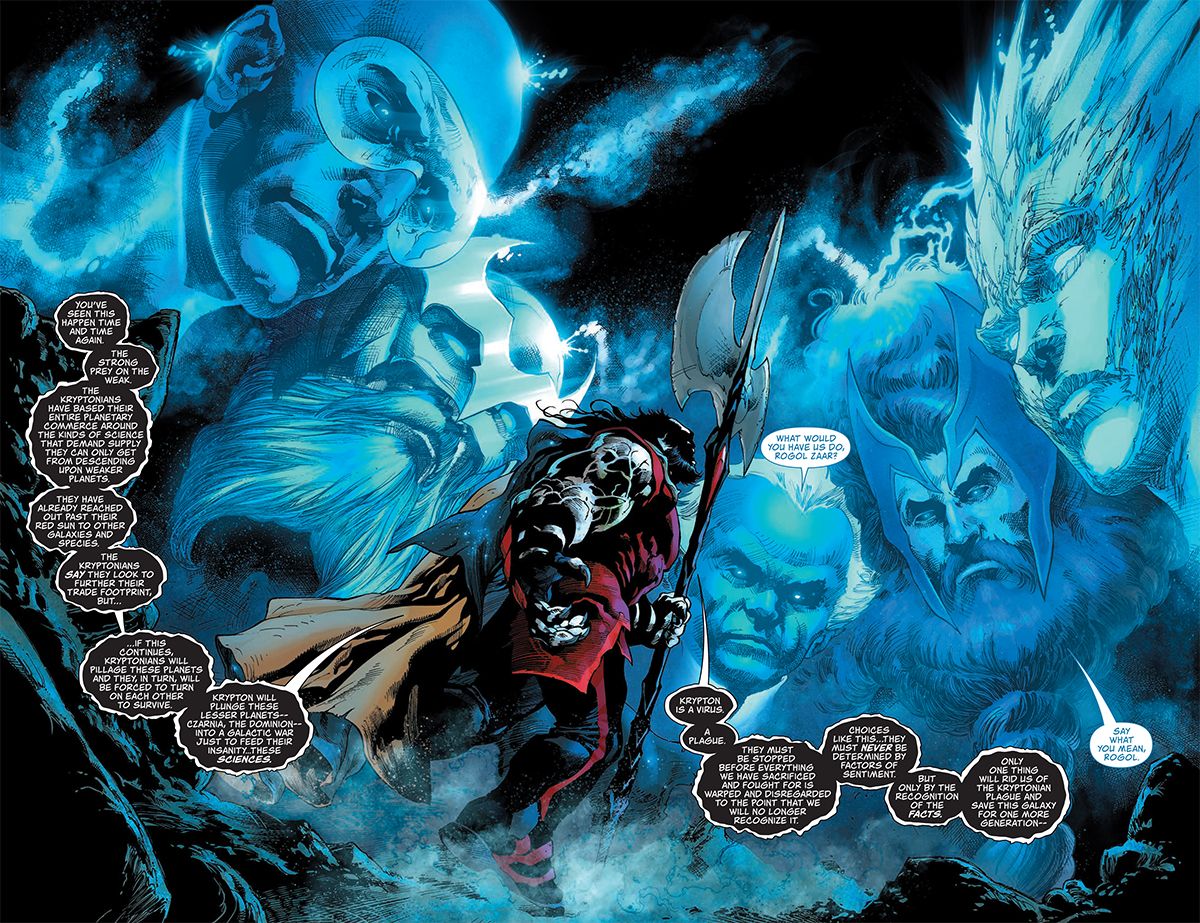WARNING: The following article contains spoilers for Man of Steel #1 by Brian Michael Bendis, Ivan Reis and Joe Prado, on sale now.
When John Byrne rebooted Superman's origin story in 1986's Man of Steel, his vision transformed the world of Krypton from a utopia of scientific advancement into a cold and impersonal planet where science had supplanted humanity. DC's New 52 relaunch largely restored the Silver and Golden Age version of Superman's home planet, and this has been retained into the Rebirth era. But this week's Man of Steel #1 by Brian Michael Bendis, Ivan Reis, Joe Prado, Jason Fabok, and Alex Sinclair, introduces a new wrinkle into Krypton's legacy: yes, it was an idyllic society of advanced scientific achievement, but that society was built on the backs of less advanced worlds.
And that, argues Rogol Zaar, is why Krypton must die.
First seen in Action Comics #1000, which marked Bendis' debut at DC, Rogol Zaar is a powerful alien being who claims to be directly responsible for Krypton's destruction. In the opening pages of Man of Steel #1, he makes his case to the godlike beings of the Quintessence. "The Kryptonians have based their entire planetary commerce around the kinds of science that demand supply they can only get by descending on weaker planets," Zaar says, noting that they have already begun pillaging other worlds for resources.
RELATED: Man of Steel's Best Easter Egg is a Nod to John Byrne's Classic Superman
So according to this new scenario, it wasn't ignoring the warnings about catastrophic climate change that doomed Krypton, but rather neoliberal imperialism. That's… a lot to take in.
It also makes a lot of sense.
Page 2: [valnet-url-page page=2 paginated=0 text='Why%20Rogol%20Zaar%27s%20Krypton%20Solution%20Makes%20a%20Certain%20Sense']
DC has been doing a hell of a lot of mucking about with Krypton's mythology lately, and in many ways there's a sense that something important is slipping away. The "Oz Effect" storyline revealed that Jor-El survived the destruction of Krypton, and failed to justify that change with the sort of story that could meaningfully replace the story of a father's desperate sacrifice. Reading Action #1000, I had a very similar reaction to the idea that Krypton's destruction was caused rather than being a natural disaster. Something is lost, and the idea of another world-destroying baddie is the opposite of compelling storytelling.
But.
Man of Steel #1 reveals Rogol Zaar as a being who believes he's acting in the interest of intergalactic peace; that he's the good guy. This, too, is nothing especially fresh, but introducing the idea that there's a cost for Krypton's prosperity is interesting, as well as being quite realistic. And that there is a cosmic being who will punish Krypton for that, specifically, and not because Kryptonians are "evil," and not to hold up some abstract idea of "balance," is pretty fascinating.
RELATED: Bendis Sheds Light on Superman’s New Foe: Rogol Zaar
"The Kryptonians say they look to further their trade footprint, but if this continues, Kryptonians will pillage these planets and they, in turn, will be forced to turn on each other to survive," Zaar says. Their path is set, he continues: "They will fight to keep their way of life," regardless of the consequences.
Ultimately, the Guardian Appa Ali Apsa denies Rogol Zaar's request to destroy Krypton on behalf of the Quintessence. Apsa alludes to some "personal history" that may cloud Zaar's attitude towards Kryptonians, but, notably, he also addresses his argument. He says, first, that Kryptonians "have not acted toward anyone with aggression" and that "Krypton must be allowed to rise and fall on their own." This is an "innocent until proven guilty" argument, and it's hard not to get behind it from that angle; but it's also an "invisible hand of the market" argument
That's where it gets a bit sticky.
Page 3: [valnet-url-page page=3 paginated=0 text='There%20Has%20To%20Be%20a%20Better%20Solution%20that%20Planetary%20Genocide%20-%20Right%3F']
Rogol Zaar is clearly respected by the intergalactic community; the Guardian shows him incredible deference and alludes to "services" and "sacrifices" Zaar has made, so he clearly has some perspective on interplanetary relations. If he says Krypton's practices are likely to lead to wholesale exploitation of less developed worlds, there's a good chance he's right. Certainly, our real world's history of imperial nations bears this out almost without exception. And the market is a truly terrible arbiter of right and wrong -- Krypton's advanced science could allow it to "rise on its own" while oppressing other planets, and according to the market this would be an unqualified success.
But does this justify destroying the entire planet?
Er, I'm not going to argue that.
Rogol Zaar believes stopping Krypton's imperialism through war would be costly and ineffective, and that therefore the only solution is to blow everything up. This… is a pretty severe case of a false binary. Surely there must be some option that does not involve catastrophic violence? Krypton will fight for its way of life; they're not going to voluntarily give up their own rapid progress just because it results in suffering and poverty on other worlds. This, too, is supported by ample real-world examples. Are there other pressures that the Guardians or the Quintessence could apply to hedge in Krypton's predatory exploration?
RELATED: Bendis Explains His Take on Superman’s Truth, Justice & The American Way
Maybe not. I'm not sure we know enough about how interplanetary politics works in the DCU to be able to point to the proper diplomatic channels. The United Planets won't be founded for another thousand years. The Guardians uphold "order" through their Green Lantern Corps, but it's not clear what authority they have beyond that. We know who's at war with whom -- Rann and Thanagar have a history, for example -- but not much else about the diplomatic side of spacefaring societies. And so maybe what happens in the absence of dialogue is "go to war or blow up the planet."
Zaar also suggests the Guardian and his circle have been bribed. This is another fairly concrete way of drawing interstellar figures into a real-world political context. If the people (or beings) making major decisions are being influenced by the most powerful elites -- elites who are not necessarily evil, but have interests to protect -- this is a significant innovation in the way we've seen the DC Universe presented to date. The Kryptonians rise on their own, and their prominence allows them to stay on top. They are an advanced society, a utopia, and they are sharing their science with the universe -- but to do that, they have to grease a few palms. Regardless of whether Appa Ali Apsa has in fact been bribed, the fact that Rogol Zaar raises it as a possibility reveals that the practice is known and prominent in this galaxy -- and that the Kryptonians have the means to accomplish it.
For his part, Rogol Zaar does begin to suggest that "there is more than one way to --" before being cut off. More than one way to stop Krypton's incursions? Besides going to war or planetary genocide? Let's hear them! Of course, it's entirely possible he was going to suggest blowing up the target worlds instead, depriving Krypton of resources and preempting wars between those planets. Zaar is, after all, full of useful ideas.
KEEP READING: Bendis Explains Why Superman is Needed in Our ‘Weird and Different’ Era


